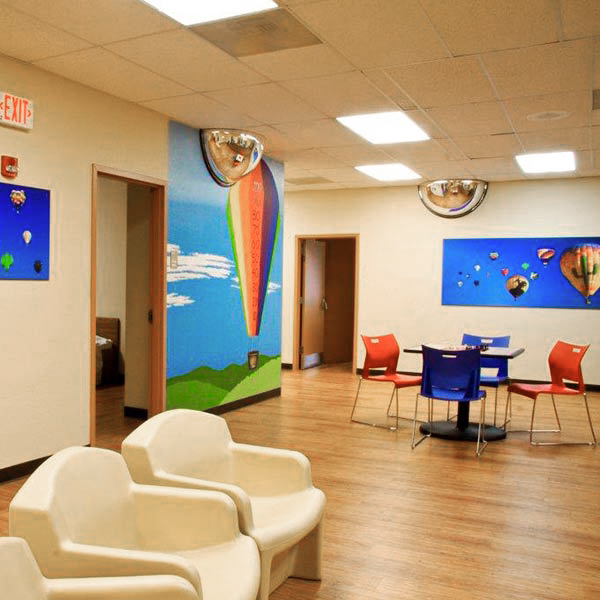Sonora Behavioral Health Hospital is dedicated to providing superior treatment to children, teens, and adults suffering from adjustment disorder. Located in Tucson, Sonora provides the comprehensive care needed to successfully manage mental health disorders and lead a life of recovery.
Treatment for Adjustment Disorder
Learn More About Treatment for Adjustment Disorder
When a person is unable to appropriately cope with life changes, such as going to a new school, moving to a new city, or receiving a diagnosis for a medical condition, there is the possibility that the individual meets diagnostic criteria for adjustment disorder. Characterized by negative emotional or behavioral responses following a change in one’s life, adjustment disorder can affect both children and adults. With symptoms that can last up to six months following the life change, a great deal of disruption and impairment can occur as a result. Individuals suffering from this stress-related mental illness often have difficulty performing daily tasks because of the anxiety and depression associated with this disorder.
Sonora Behavioral Health Hospital, a 140-bed acute inpatient psychiatric hospital, is a premier provider of behavioral health, drug & alcohol addiction, and chemical dependency treatment for children, adolescents, and adults in Tucson. We acknowledge the unique needs of patients who are struggling with mental health concerns and diligently work with patients and their families in working towards recovery. With treatment that is designed to address every aspect of mental health conditions like adjustment disorder, we at Sonora implement treatment modalities and techniques geared towards alleviating distressing symptoms and restoring healthy functioning.
Helping a Loved One
Helping a Loved One or Family Member Get Treatment
Witnessing a person struggling with the symptoms of adjustment disorder can be heart-wrenching. You may want to offer help to alleviate the individual’s anxiety or try to cheer him or her up when they seem depressed. In order to be of the most help to a person struggling with adjustment disorder, it can be advantageous to try the following:
- Learn about adjustment disorder so as to increase your own understanding of what your friend or family member is going through.
- Avoid passing judgment as this could increase the severity of certain symptoms and lead to more distress for the individual.
- Be a source of ongoing encouragement, emphasizing that symptoms can be overcome.
- Look into treatment options in Tucson that can help your friend or family member regain control over his or her life.
- Remain supportive even when setbacks occur.
Why Choose Us
Why Consider Treatment at Sonora Behavioral Health
The effects of adjustment disorder can lead to social isolation, poor school or work performance, mood disturbances, self-harm, suicidal ideations, and even attempts to end one’s own life. Following an event that involves a lot of change can cause a person to feel as if his or her life is spinning out of control and result in these damaging effects. Furthermore, without treatment, a person suffering from adjustment disorder can be at a greater risk of developing other mental health conditions, such as depression, anxiety, and even chemical dependency issues.
Seeking care at an inpatient treatment center is an effective treatment option that has helped many people overcome the symptoms of adjustment disorder. With this kind of treatment, a person is away from the everyday stressors of life and can focus strictly on healing. Additionally, if medication is required to help alleviate symptoms, inpatient treatment at a psychiatric hospital affords people access to qualified medical staff who can assist in exploring medication options and monitor medication usage. In addition to on hand medical staff, mental health professionals are available 24 hours a day to provide ongoing support that can be extremely beneficial in helping people remain on the recovery track. Treatment modalities and techniques at an inpatient treatment center also foster recovery and assist those with adjustment disorder in building skills that will serve an individual well even after discharge.
Philosophy & Benefits
Adjustment Disorder Treatment Philosophy and Benefits
At Sonora Behavioral Health Hospital, we make it our mission to provide behavioral healthcare services that are a cut above the rest. We employ proven and evidence-based treatment modalities and techniques that teach effective coping skills that can be used for a lifetime. Our experienced and qualified staff diligently work to provide comprehensive medical and psychiatric assessments, diagnostic services, and treatment. By treating acute illnesses in a sensitive and caring manner, at our treatment center staff is able to assist patients in regaining and maintaining their highest level of functioning.
Types of Treatment
Types of Treatment Offered at Sonora Behavioral Health Hospital
Upon arrival at our psychiatric hospital, each patient who comes to us for adjustment disorder treatment will complete an initial assessment that will include a physical examination, collection of medical history, psychiatric evaluation, and psychological assessment. During this time, we will also identify social skills, cultural and family issues, and determine any other needs that each patient may have. We use a multidisciplinary approach with each patient and our psychiatric clinical team is composed of psychiatrists, psychiatric nurses, social workers, therapists, internists, and expressive art therapists who are all trained and experienced in treating individuals with emotional health and substance abuse issues. All treatment plans are individualized and include the following methods:
Medication management: Some people require medication to alleviate the debilitating symptoms of adjustment disorder. When pharmaceutical intervention meets the needs of a patient, medical staff, including nurses and psychiatrists, will work with the individual in exploring this option for treatment. Furthermore, individuals prescribed medication are monitored so as to ensure that proper medication is being administered to alleviate distressing symptoms.
Group therapy: At Sonora, our main form of treatment is daily group therapy sessions. We do not use process groups, but instead use solution-focused groups that teach patients a variety of skills needed to recover from adjustment disorder. Some of our group topics include sleep, hygiene, coping skills, stress management, self-awareness, relaxation, and self-help skills training.
Family meetings: Family members are involved in all aspects of the treatment process and receive education about their loved one’s condition. In addition, family members are in constant communication with case managers throughout their loved one’s stay.
Additional treatment methods may include the following:
- Expressive therapy, including art therapy
- Weekly dietary groups
- Recreation therapy
- Daily meetings with social worker
Continuing Care
Continuing Care and Levels of Treatment
The discharge planning process begins as soon as a patient is admitted to our hospital. Within 48 hours of admission, a social worker will evaluate each patient for available resources including placement, transportation, and aftercare treatment. When it is time for the patient to leave our inpatient treatment center, the social worker will coordinate placement with the patient, family members, outside agencies, or private insurance. They will also coordinate transportation from the hospital on the day of discharge to the patient’s next placement in Tucson or elsewhere as well as aftercare treatment appointments based on individual needs of each patient.
For adult patients that no longer require the intense level of psychiatric care provided by inpatient treatment, Sonora Behavioral Health offers outpatient treatment that consist of nine to twelve hours of group therapy a week. These groups allow participants to process real-life scenarios as they happen and get the support they need, as well as practice the new techniques that they are learning. These eight to twelve weeks of intensive treatment give participants the chance to use group to work through emotional and psychological issues that keep them locked in a state of distress. Through our outpatient programs, patients learn techniques that they will continue to use for the rest of their lives to stay healthy and happy.
Our partial hospitalization program (PHP) and our intensive outpatient program (IOP) allow patients to live at home and attend school or go back to work while still receiving the treatment that they need. PHP is held 5 days a week for 6 hours a day, while IOP is held 3 days a week for 3 hours a day. Both programs have a mental health and chemical dependency track. In addition to PHP and IOP, we have an aftercare program for alumni that is held once a month for as long as patients need.
All of the services at Sonora Behavioral Health Hospital encourage patient success as individuals navigate the process of healing and recovery. For those suffering from adjustment disorder in Tucson, Sonora can be the beginning of a life free from the symptoms and negative effects of this mental health condition.














